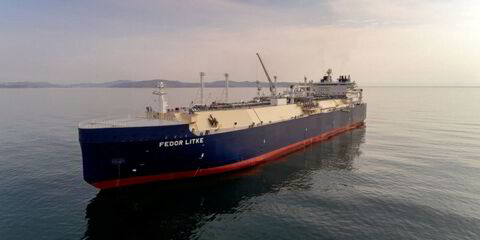Executives of two Jones Act tanker owners have painted a picture of a market that could start improving — but not until 2019.
American Shipping chief executive Paal Magnussen told TradeWinds that demand growth for Jones Act tankers, which ply the protected US cabotage trades, could combine with an improved vessel supply scenario over the next two to three years to help rates.
Robert Grune, a senior vice-president at Crowley Maritime who is also general manager of the diversified shipowner's petroleum services division, said he expects the status quo to continue for 18 months.
But he said supply will drop out of the market over that period, allowing his company to increase margins based on "some improvement" in the market, although not as strong as the peak three years ago.
The duo's comments at the TradeWinds Jones Act Shipping Forum in Washington DC came as Jones Act tankers remain in an earnings slump that followed the convergence of a rush of newbuilding deliveries with a drop in oil production.
Magnussen, whose Oslo-listed company owns a fleet of US-built tankers on charter to Overseas Shipholding Group (OSG), pointed out that the orderbook for such ships runs out this year, while articulated tug barges operating in the same market will see newbuilding deliveries come to a halt next year.
More balance in supply and demand should be seen in the cabotage market in the next 12 to 18 months, he said on the sidelines of the forum.
"Supply growth is stopping," Magnussen said. "There’s a good portion of the fleet, about 20%, which is older than 30 years. I think there is good reason to believe that a number of the ships will leave the fleet once they face expensive dry docking."
But the idea that scrapping could boost the market led to scepticism from the discussion moderator, Team Tankers executive chairman Morten Arntzen, a veteran of the Jones Act market by virtue of his former role at the helm of OSG.
"Whenever I hear shipowners talk about scrapping as a driver, or analysts [talk about it], I shake my head," said Arntzen, who is also senior shipping industry advisor at Macquarie Specialised Investment Solutions. "Is this just wishful thinking? Jones Act ships stay around forever."
But Grune said an additional driver for potential scrapping is increased vetting from major oil companies that charter Jones Act ships. Some vetting requirements are tough for even newer ships to pass, he acknowledged.
"They've always had high vetting requirements, so I'm sure they always will. However, that being said, I've seen this increased ramp-up in the scrutiny on safety issues," he said.
"That's going to be a catalyst, if you will, that might drive this older tonnage out faster."
Grune noted that additional requirements such as ballast water rules that need more work in shipyards will also help send older tankers to the recyclers.
As for demand for Jones Act tankers, Magnussen said rising shale should boost the spread between international and US oil prices and expand the lagging trade between the US Gulf of Mexico and the East Coast.
"On the demand side, it’s actually not [as] bad as you may think. The clean products trade is actually stronger than ever," he said. "More shale, we think, will lead to a bigger spread between US oil and foreign oil, and that spread will potentially drive demand for Jones Act tankers, bringing US shale from the Gulf up to the Northeast refineries.”
Meanwhile, Grune said Jones Act tanker rates are half what they were at the high point of the market, but that does not mean the Jacksonville shipowner is not making money.
"However, with that being said, we've focused on cost controls," he added.
"We have been able to maintain profitability with the rates even at this depressed level."



